Cliffhangers are perfectly fine if you’re writing a series pilot or season finale. Not so much if you’ve written what purports to be a full-length play, which is why, engaged as I was throughout Echo Theater Company’s Babe, I left feeling frustrated, angry, and confused as to why playwright Jessica Goldberg didn’t finish what she’d started so provocatively sixty-five minutes earlier in a more satisfyingly conclusive way.
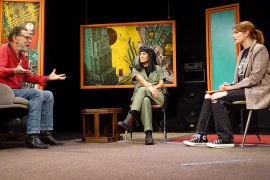 Babe’s central conflict is set up in the play’s first scene, which pits 60something recording industry A&R legend Gus (Sal Viscuso) against 28-year-old hopeful Kaitlyn Becker (Wylie Anderson), who’s come to apply for a job working under the man who discovered the late great rock legend Kat Wonder back in the ‘90s.
Babe’s central conflict is set up in the play’s first scene, which pits 60something recording industry A&R legend Gus (Sal Viscuso) against 28-year-old hopeful Kaitlyn Becker (Wylie Anderson), who’s come to apply for a job working under the man who discovered the late great rock legend Kat Wonder back in the ‘90s.
What Kaitlyn hasn’t reckoned with is the generation clash that’s about to ensue.
Sal is the kind of man who calls every female “girl” no matter her age, who sees no reason why he shouldn’t tell a “girl” she’s got “a nice fucking ass” if that’s what she’s got, and if he hires Kaitlyn, it’ll be in part because “most of the artists we work with are attractive and … they like to be around people they can imagine themselves fucking,” and the “girl” who’s come looking for a job is nothing if not attractive.
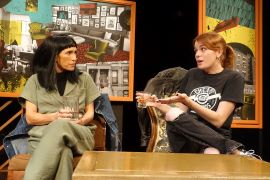 Kaitlyn, on the other hand, grew up on the Upper East Side, was “super active” at Berkeley (where she served as vice president of Diversity and Inclusion committee, a proud member of Gender Sexuality Alliance, and on the board of Students for Change), and spent every other Saturday at Berkeley bringing fresh bread and “a pop-up sound bath” to the “the unhoused.”
Kaitlyn, on the other hand, grew up on the Upper East Side, was “super active” at Berkeley (where she served as vice president of Diversity and Inclusion committee, a proud member of Gender Sexuality Alliance, and on the board of Students for Change), and spent every other Saturday at Berkeley bringing fresh bread and “a pop-up sound bath” to the “the unhoused.”
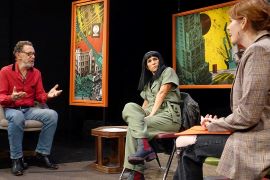 Caught between these two diametric opposites is Gus’s decade-and-a-half-younger “right hand man” Abigail (Julie Dretzin), who’s been with him since the discovery of Kat Wonder, though these days the higher-ups have Abby “babysitting” Gus because (in his words) “they don’t want me to have a girl alone in my office anymore, like I was some kind of rapist.”
Caught between these two diametric opposites is Gus’s decade-and-a-half-younger “right hand man” Abigail (Julie Dretzin), who’s been with him since the discovery of Kat Wonder, though these days the higher-ups have Abby “babysitting” Gus because (in his words) “they don’t want me to have a girl alone in my office anymore, like I was some kind of rapist.”
Still, despite the likelihood of stormy seas ahead, Gus gives Kaitlyn a junior A&R position seeking out new talent, and given that the younger woman grew up idolizing Kate Wonder, “spokesperson for a new generation of female rage,” she accepts the job, unaware at the time that said female rage will soon be directed at her new boss.
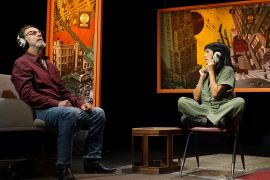 Playwright Goldberg has written four clearly defined and delineated characters (Anderson doubles as Kat Wonder in flashbacks), the dialog she has given them snaps, crackles, and pops, and the cast, under Chris Field’s direction, bring all four to vivid life.
Playwright Goldberg has written four clearly defined and delineated characters (Anderson doubles as Kat Wonder in flashbacks), the dialog she has given them snaps, crackles, and pops, and the cast, under Chris Field’s direction, bring all four to vivid life.
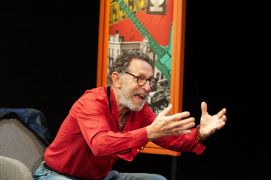 Viscuso’s unapologetically sexist Gus is so authentic, he’ll have you believing the actor is that character in real life (which I’m guessing he isn’t). And depending on your age, gender, and point of view, you may actually find yourself sympathizing with a man who’s done things the same way for decades, sees no reason a an entitled Millenial should force him to change, and can’t get it through his stubborn head that his job just might be at stake.
Viscuso’s unapologetically sexist Gus is so authentic, he’ll have you believing the actor is that character in real life (which I’m guessing he isn’t). And depending on your age, gender, and point of view, you may actually find yourself sympathizing with a man who’s done things the same way for decades, sees no reason a an entitled Millenial should force him to change, and can’t get it through his stubborn head that his job just might be at stake.
 Star-in-the-making Anderson’s Kaitlyn is poised, self-assured, rage-filled, and utterly convinced that her way is the only way. Not only that, but Kat has an electrifying energy and sex appeal that makes it clear why she became a rock icon.
Star-in-the-making Anderson’s Kaitlyn is poised, self-assured, rage-filled, and utterly convinced that her way is the only way. Not only that, but Kat has an electrifying energy and sex appeal that makes it clear why she became a rock icon.
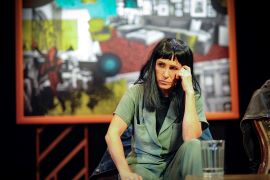 Last but definitely not least (since her part is the largest of the three), Dretzin is blazingly, achingly real as a woman who’s not only facing a life-threatening health challenge but gradually coming to the realization that she may have sacrificed her own success to support a man who has never given her her due.
Last but definitely not least (since her part is the largest of the three), Dretzin is blazingly, achingly real as a woman who’s not only facing a life-threatening health challenge but gradually coming to the realization that she may have sacrificed her own success to support a man who has never given her her due.
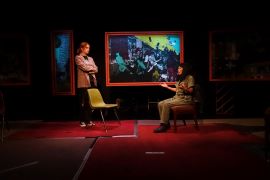 And Babe looks and sounds terrific thanks to scenic designer Amanda Knehans, costume designer Elena Flores, lighting designer Hayden Kirschbaum, and sound designer Alysha Bermudez, all four at the top of their craft.
And Babe looks and sounds terrific thanks to scenic designer Amanda Knehans, costume designer Elena Flores, lighting designer Hayden Kirschbaum, and sound designer Alysha Bermudez, all four at the top of their craft.
Babe’s World Premiere is produced by Kelly Beech, Elliot Davis, and Fields. Elana Luo is assistant director. Alysha Bermudez is production stage manager. Lucy Pollak is publicist.
There’s just one hitch, and for me it’s a game-changer.
After setting up all this conflict in the play’s first sixty-four-and-a-half minutes, playwright Goldberg chooses to end it all with an abrupt blackout that leaves far too many questions unanswered, most significantly, what on earth that final sudden blackout means.
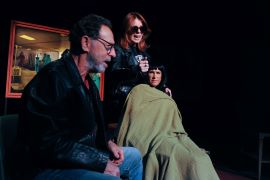 Babe is not the first play I’ve seen that concludes in a less than satisfying way. Still, I can’t ever recall leaving a theater feeling as shortchanged as Babe left me feeling. An extra ten minutes, maybe even fifteen, could have made all the difference (and Babe still would have clocked in at under an hour and a half).
Babe is not the first play I’ve seen that concludes in a less than satisfying way. Still, I can’t ever recall leaving a theater feeling as shortchanged as Babe left me feeling. An extra ten minutes, maybe even fifteen, could have made all the difference (and Babe still would have clocked in at under an hour and a half).
The Echo Theater Company @ Atwater Village Theatre, 3269 Casitas Ave., Atwater Village.
www.EchoTheaterCompany.com
–Steven Stanley
September 25, 2022
Photos: Cooper Bates
Tags: Atwater Village Theatre, Echo Theater Company, Jessica Goldberg, Los Angeles Theater Review


 Since 2007, Steven Stanley's StageSceneLA.com has spotlighted the best in Southern California theater via reviews, interviews, and its annual StageSceneLA Scenies.
Since 2007, Steven Stanley's StageSceneLA.com has spotlighted the best in Southern California theater via reviews, interviews, and its annual StageSceneLA Scenies.







 COPYRIGHT 2025 STEVEN STANLEY :: DESIGN BY
COPYRIGHT 2025 STEVEN STANLEY :: DESIGN BY